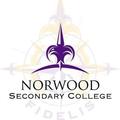Year 9 Electives - Technologies

Cafe Bakery
Course Description:
Students will produce a range of bakery and café-style sweet and savoury food items. These will include cakes, pastries, slices, and biscuits made using a variety of preparation methods such as creaming, beating, rubbing in, and melt-and-mix techniques. Students will respond to design briefs that encourage creativity and skill development. They will also participate in café-style events and activities that provide opportunities to showcase their abilities in a practical and engaging context.
Assessment:
- A range of café & bakery productions
- Design & research tasks
- Café team event
Gamemaking and Microprogramming
Students are introduced to the fundamentals concepts of computer programming by first looking at some early computer games. Using a visual programming language called Scratch, students create interactive stories, games and animations. Scratch, developed by MIT Media Lab, is known for its block-based interface, which makes it easier for beginners to learn coding concepts.
Coding skills and computational thinking and are encouraged to help students express their creativity through interactive projects. Making simple games, like breakout and pong provides an enjoyable and accessible way for students to learn about game coding and create software, whilst they foster creativity, problem-solving skills, and collaboration.
We introduce students to Object Oriented Programming (OOP) using Python for its relative simplicity and versatility. As a language, Python is in high demand and has syntax that is easier to read. Students work through a Python course learning the fundamentals of the language and build a strong foundation for future programming.
The subject concludes with some Website Development. HTML and CCS are foundational web technologies introduced to enable students to understand and work with web pages, improve online content, and even jumpstart more advanced coding skills. Students build several web pages that involve hyperlinks, images, menus and layout. Areas of study include: introduction to coding using a visual interface, creation of an application as a project, understanding control structures – Sequence, Selection(Conditional), Iteration (loops), introduction to Object Oriented Programming languages (Python)
Assessment:
- A folio of programs made with Scratch
- Measured progression through our interactive Python courses
- Creation of a single page responsive website for a small business
Marvellous Meals
Course Description:
Students plan, prepare and present a variety of delicious meals that meet the nutritional, budgetary and social needs of individuals and families. Productions focus on daily meals and highlight the importance of convenient, nutritious and sustainable meals. A range of preparation processes, cooking methods and equipment will be used. Design scenarios on breakfast, lunch and dinner will enable the development of skills in investigating, generating ideas, collaborating, managing, producing and evaluating
Assessment:
- A range of meal productions
- Design & research tasks
Metal and Silver
Course Description:
Students build on previous experience in materials technology by designing and producing products using metal and silver. They learn a variety of techniques including cutting, shaping, joining, and finishing. Students explore basic jewellery-making skills and small-scale fabrication while using the design process to develop their ideas. The course includes the introduction of CAD (Computer-Aided Design) to support planning and visualisation. Students investigate the environmental impact and ethical sourcing of metals used in design.
Aims/Objectives:
- To develop practical skills in working with metal and silver
- To apply the design process in creating functional and decorative items
- To encourage creativity, precision, and iterative problem-solving
- To introduce ethical and sustainable considerations in material use
Tasks/Activities:
Students will be taught:
- Safe and accurate use of hand tools and machinery for metalwork
- Techniques such as cutting, filing, joining, polishing and decorative finishing
- Design and production of small-scale silver jewellery items
- Use of CAD to assist in design development
- Investigation of sustainability and ethical sourcing in metal design
Assessment:
- Design folio including research, ideation and CAD-based planning
- Completion of metal and silver projects demonstrating skill and creativity
- Research and written tasks exploring ethical and sustainable practices
- Evaluation and reflection on the final product and design process
Step into Fashion and Craft
Course Description:
Students will be introduced to fashion design garment construction. Basic sewing skills are extended, and new skills introduced including sewing techniques for woven and stretch fabrics, and use of the overlocker. Students will also become familiar with commercial pattern reading. Design scenarios will enable the development of skills in investigating, designing, producing and evaluating.
Assessment:
Folio and Production work, including:
- Construction of a bag
- Street wear/ leisure wear, including boxer shorts and hoodie production
- Fashion drawing
Wood
Course Description:
Students build on prior knowledge to design and produce functional and decorative timber products. They learn advanced woodworking techniques using both hand tools and machinery, while incorporating CAD (Computer-Aided Design) into their planning. The course encourages sustainable thinking by exploring the environmental impact of timber use and promoting ethical design decisions. Students engage with the full design process—from research and ideation to production and evaluation.
Aims/Objectives:
- To further develop skills in woodworking and safe tool use
- To enhance understanding of the design process through hands-on project work
- To introduce sustainable forestry practices and ethical considerations in material use
- To foster creativity, precision, and iterative design thinking
Tasks/Activities:
Students will be taught:
- Safe and accurate use of hand and power tools
- Advanced joinery techniques and production methods
- Application of CAD in the design process
- Design thinking using the Double Diamond process
- Investigating sustainable timber sourcing and ethical manufacturing
Assessment:
- Design folio and planning using CAD
- Production tasks demonstrating safe and skilled construction
- Research tasks on sustainability in woodworking
- Evaluation of final product and reflection on design development
